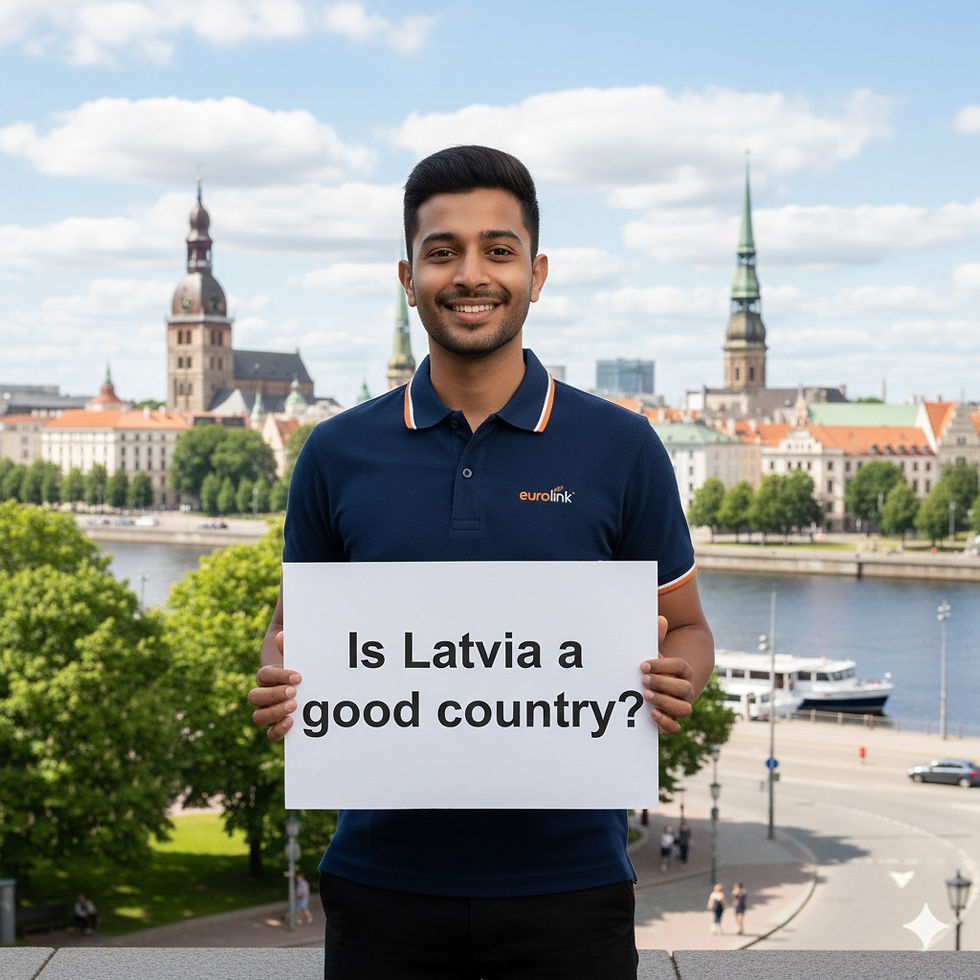History of Latvia
- Eurolink International
- Dec 16, 2025
- 3 min read
The history of Latvia is like a long river; it flows forward at all times, whether it is calm or turbulent. Ancient tribes, strong empires, foreign rulers, conflicts, and ultimately its own arduous independence have all influenced this tiny Baltic nation. Despite its current state of peace and modernity, Latvia's history is filled with tales of bravery, tenacity, and cultural pride.
The Most Ancient Origins
Ancient Baltic tribes lived on the land that is now Latvia long before cities existed. These tribes hunted in the forests, traded with nearby peoples, and lived by rivers. They were renowned for their artistry, particularly in metalworking and jewelry, as well as their close ties to nature, which Latvians still value today.
These tribes eventually divided into two major groups: the Curonians and Semigallians in the west and south, and the Latgalians in the east. Although they had not yet united as a nation, they had a common language and customs.
The Crusaders' Arrival
When German missionaries and crusaders arrived in the 12th and 13th centuries, everything changed. They progressively introduced Christianity to the area by constructing churches, trading posts, and forts.
Riga, which would go on to become one of the most significant cities in the Baltic Sea region, was founded during this time in 1201.
Many of the influential families and leaders in Latvian territories were of German ancestry for centuries as German influence grew. However, the locals persisted in preserving their identity and language.
A Territory Sandwiched Between Superpowers
Latvia was surrounded by strong neighbors for hundreds of years. Due to its advantageous location on the Baltic Sea, the region was the subject of conflicts between several empires.
The region that is now Latvia was governed or impacted at various points in time by:
The Livonian Order of Germany
The Commonwealth of Poland and Lithuania
Sweden's Kingdom
The Empire of Russia
The area was influenced by each of these powers in terms of architecture, religion, and culture. However, Latvians passed down their language, storytelling, folk songs, and pagan customs from one generation to the next.
First Independence (1918–1940)
On November 18, 1918, Latvia finally proclaimed its independence after centuries of foreign domination. This era is proudly remembered. The nation strengthened its sense of national identity, built schools, and grew its economy.
Riga gained recognition as a wealthy, stunning city with a thriving culture and striking Art Nouveau architecture. Sadly, this peaceful era was short-lived.
Occupation and War
During World War II, Latvia suffered greatly. The Soviets took over first, followed by the Nazis, and then the Soviets once more. During this period, hundreds of thousands of people either died or were displaced.
Latvia was ruled by the Soviet Union for almost 50 years following the war. Latvians maintained their traditions in secret despite stringent control, particularly through folk festivals and music.
Occupation and War
During World War II, Latvia suffered greatly. The Soviets took over first, followed by the Nazis, and then the Soviets once more. During this period, hundreds of thousands of people either died or were displaced.
Latvia was ruled by the Soviet Union for almost 50 years following the war. Latvians maintained their traditions in secret despite stringent control, particularly through folk festivals and music.
The Restoration of Freedom and the Singing Revolution
The Singing Revolution was a nonviolent uprising by Latvians in the late 1980s. To express solidarity, demand freedom, and sing folk songs, thousands of people came together. After regaining its independence in 1991, Latvia started to rebuild as a democratic country.
One of the most exquisite periods in Latvian history was this nonviolent, musical struggle for independence.
Today in Latvia
As a member of the EU and NATO, Latvia is a contemporary European nation where traditional customs coexist with a new, optimistic outlook. Although the cities are contemporary, innovative, and brimming with youthful vitality, the people place a high value on their heritage, particularly folk music, nature, and festivals.
Latvia's history is one of perseverance, spanning from prehistoric tribes and medieval crusaders to independence and contemporary rebirth. It demonstrates how a tiny country can withstand centuries of hardship and remain strong, proud, and culturally rich.





Comments